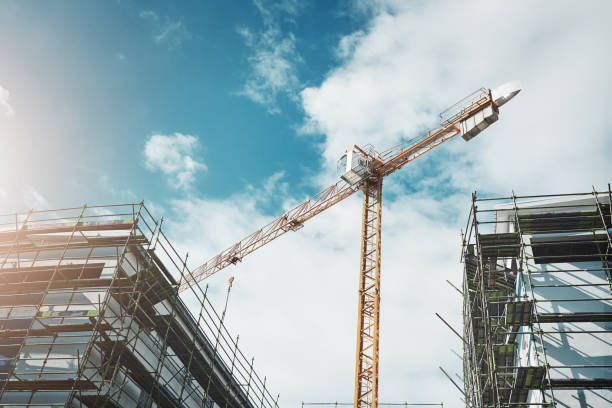When deciding on a property to buy, you probably have been asking yourself the question “Should I buy an existing property or should I buy off the plan?”. It is also a question that a lot of people wrestle with.
While the majority of Australian people tend to buy “second-hand” or completed homes, the term “off the plan property” is getting more and more attention from property investors & enthusiasts due to the significant benefits.
So is buying off the plan worth the hype? Let’s find out!
What is Buying Off The Plan?
Essentially, buying a house or an apartment off the plan is entering a contract to purchase a property prior to the completion of the property title. This means signing off on purchasing a property before it has been built or finalised (pre or mid-construction stage).
Buying a home prior to completion also means that you can select your dream home from the architectural drawing, view the developer’s plans and designs, and get to know the location before you move in.
This is the key difference between buying off the plan and a completed product.
All Benefits of Buying Off The Plan
#1 More Freedom – More Choices
Time to save
Buying off the plan provides you with additional time to save for future repayments during the construction process while the property has already been secured and its value could potentially increase at the settlement date.
Purchase price discount
To encourage sales in the early stage, developers may set their price at a more attractive rate and sometimes offer you a discount on the purchase price when buying off the plan, especially before construction begins. Once the construction begins, the prices will go up.
Input into design
When buying an existing property, you have very little choice in terms of the finishes of the property. On the other hand, since buying off the plan can occur before the construction begins, you potentially have more options of level, aspect or floorplan and an opportunity to negotiate changes to the interior design.
Therefore, it is important to check with the developer what options are available as this may have a big impact on the property value over time.
Builder’s guarantee
Depending on your state or territory, most off the plan projects should be protected by builders’ warranty insurance while your property is being built, which means certain structural or interior building faults that emerge within a certain timeframe must be repaired by the builder.
#2 Deposit and Government Incentives
When purchasing off the plan apartment, the purchase price can be much less compared to an established property, as developers typically offer lower prices at the early stages of the project along with government tax benefits such as stamp duty concessions, especially before construction starts.
Deposit Benefits
When buying off the plan, typically you’ll only have to pay a deposit to the developer and then pay the remaining balance on completion of the property. This means you’ll have more time to save before settlement while the property is being built.
In addition, with off the plan property you generally only need to pay 10% toward today’s price, or even as little as 5% for some projects.
Tax benefits
The tax system in Australia is set up to favour property investment. It is important to note that you can always claim tax deductions on your investment property as an investor. There’s more tax depreciation available on new properties, meaning you can maximise benefits and improve after-tax cash flow
Government concessions
In some States and Territories in Australia, you may be able to claim incentives when buying an off-plan dwellings. Concessions on stamp duty grants are the most common incentive offered, which can be a saving of tens of thousands of dollars.
If you are buying your first home, you could also be eligible for the First Home Owner Grant (FHOG). Rules and grant amounts vary depending on the state or territory, so you can check out your eligibility here.
#3 Make a capital gain before you even move in!
Capital growth
The “Buy and hold” strategy has long been a long-term passive strategy for real estate investors. As the property market performing strongly over the last few decades, the longer you hold a property, the more return on investment you will get.
As mentioned above, buying off the plan means you tend to buy a property at its lowest value, there is a high potential for your property to increase in value during the construction period.
Depreciation benefits
Over time, any building and its associated assets will experience wear and tear. That is why new properties are easier to hole as they generally require less maintenance and fewer repairs than “second-hand” homes, hence less depreciation in value.
Under the current legislation, owners of any property that generate income can claim the depreciation tax deduction. Overall buying off the plan provides greater tax depreciation benefits than buying an established property – meaning that a larger portion of your property expenses and bills are deducted from your tax return.
The real risks
Although buying off the plan apartments might sound like a wonderful investment strategy, there are certain risks and downsides that might come with it.
The market could change
Due to the large delay between the start of construction and completion, it is possible that there may be changes in the market conditions. This means the property value may decrease by the time the property is complete.
However, in most cases, this tends to go the other way, which means your property value will increase, your Loan to value ratio (LVR) will go down and subsequently give you a better chance of formal approval.
Changes in financial circumstances
It could take up to 2 years for your off the plan property to be complete and in that time it’s expected that your financial situation to remain unchanged. However, it is unrealistic that your situation will remain the same for 2 years.
This can be your personal financial income or a wider economic environment such as changes in interest rates that are out of your control. Therefore, it is important to account for situational changes and prepare a good buffer in case this happens.
The property may not meet your expectations
When you purchase a property off the plan, you are committing to something that has not yet been built, hence it will come with uncertainty. Buying off the plan restricts the ability for you to inspect the property like you would a fully completed project and therefore it can be more difficult to gauge if it fits your wants and needs.
As the building is incomplete, there is the possibility for construction delays when buying off the plan, this opens up the potential for increased costs or inconvenience.
Foreign investors can suffer from policy changes
In recent years, the Australian Government has been pushed politically to prohibit foreign investment in real estate. Recently, foreign buyers who were to buy off the plan 12-18 months ago can no longer qualify for a home loan at the time of settlement. In addition, June 2017 saw the 12-month deferral of stamp duty payments for off the plan purchases in New South Wales (NSW) scrapped for foreign investors.
Contracts for buying off-the-plan
An off the plan contract of sale should contain the following:
- A Plan of Subdivision – A proposed plan that provides information on the number of lots in that proposed subdivision. Your off the plan contract should specify a particular lot that you are going to purchase.
- Architectural Drawings – Drawing that shows the scope of what the construction of the home or commercial lot will look like to the buyer.
- Design Specification – often prepared by the developer’s architect and will include a list of fixtures, fittings and finishes of the complete property. These can be subject to change so it is important to understand what you are buying.
- Deposits & GST – GST payable will most likely be included in the price when you are buying off the plan.
- Owners Corporation – Information of the owners’ corporation (or body corporate) should be disclosed when the plan of subdivision is registered.
- Sunset Clause and extensions – A sunset clause is included in every off-the-plan contract. A clause of this type includes a deadline by which either the vendor or the purchaser can terminate the contract if the plan of subdivision is not registered.
- Measurements and Floorplan – Your off the plan contract will also include a floorplan and detailed measurements of your property. You should ensure that these measurements are consistent.
- Disclosure statement
The seller must also give you a disclosure statement that:
- Gives their name and address
- Identifies you as the buyer (by name and address)
- Clearly identifies the land or unit you are buying
- Puts in writing their claims or promises about a future certificate of title.
To identify the property, the developer must disclose:
- the proposed number of the lot
- the total area of the lot
- the proposed orientation of the lot (by referring to the north).
How much deposit do you need?
Once you’ve found a development you love and have decided on the floor plan, a contract will be drawn up and sent to your solicitor. Your contract will outline exactly what you are buying, what your obligations are regarding the purchase and payment, as well as the developer’s responsibilities and obligations to you.
Your solicitor will go through all the key information in the contract with you before the contracts are entered. Make sure you have all your questions answered before you sign.
Once the contracts are signed, the developer will sign an identical contract and you will exchange them. This will be arranged through your solicitor. After the contracts, you need to pay a deposit. A deposit of 10% of the total purchase price is legally required, however often there are special conditions available.
Under certain circumstances, a developer may elect to accept a partial deposit of 5% or they may be willing to accept a $1000 holding deposit with the remainder of the deposit to be paid within a certain time frame – giving you additional time to save the money needed.
Typically, your deposit is paid into a trust account where it will be held until the building is completed and ready for settlement. However, you can also use deposit bonds and bank guarantees to make your deposit.
Things to consider before buying off the plan
As mentioned above, there are some instances where development doesn’t go ahead. You should get your deposit back if this happens, but by tying up your money you may have missed out on interest and capital gains through other investments
Things can be delayed, which may also tie up your money. Although banks and other lenders may offer conditional approval (finance in principle) for off-the-plan purchases before construction commences, they won’t actually loan you any money until at least the property is built and they have performed a valuation of the finished product and re-evaluated your financial situation.
Your ability to service the home loan and/or resell the property may be impacted if your financial situation changes. The property market may fall and interest rates may rise between the time you agree to buy and the time you actually purchase the property.
Therefore, here are several things you need to do before securing an off the plan purchase.
- Hire a conveyancer or solicitor to go through the contract with you closely. Look for any unexpected costs or conditions that may affect you down the line. Also, look at what will happen should things not go to plan.
- Look for any sunset clause in the contract of sale to see how long the developer has to finish the project.
- Spend time researching the people involved in the project, such as the developer, builder, architect and financier. Is the DA approved? Are you confident that the developer will perform the job to the quality you expect?
- Explore the surrounding location. Is it a good location with strong potential for growth – and is it the right type of property for the right area?
- Make sure you know what brands are being used for things such as inclusions and finishes (e.g. the dishwasher and oven), as well as what alternative brands will be used if the first choice isn’t available.
Conclusion
In today’s market, more and more Australians are choosing off the plan apartments instead of houses due to the benefits that come with it. This can include affordability, convenient location or the ‘lock up and leave lifestyle.
Buying an apartment off-the-plan has many appealing features and benefits for both investors and home buyers, but there are also many important considerations to understand before signing a purchase contract.
With years of experience in assisting customers with off the plan purchases, our team at Liviti can provide you with tips and guides for the smoothes property purchasing journey you can get. Get in touch with our team today at (02) 9056 4311 or check out our off the plan property options here.












